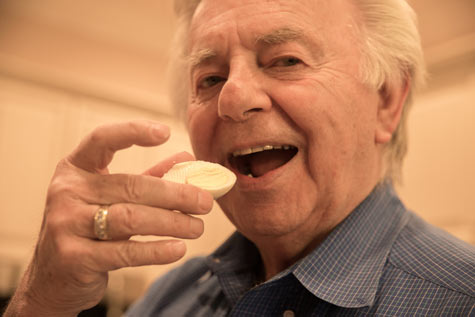
Protein intake impacts how the aging body recovers during periods of stress.
Pass the eggs, please! Current research is highlighting the necessity of a protein-rich diet for seniors, in particular during instances of stress, such as when battling a chronic disease or acute illness, or preparing for a medical procedure or hospitalization, when protein is digested a lot less efficiently. And even when seniors are healthy, protein intake affects seniors’ muscle strength and mass, healthy bones and much more.
Nevertheless, as many as 1/3 of all older adults aren’t consuming adequate quantities of protein, for many reasons, which can include:
- Taste impairments
- Difficulties with swallowing
- Monetary limitations
- Reduced appetite
- Dental issues
And, the less active lifestyle that numerous older adults lead even further compounds the damaging impacts of too little protein intake, including:
- Deteriorating mobility
- Reduced muscle mass and strength
- Extended recovery times when ill
- Eventual loss of independence
Thankfully, people who do eat suggested levels of protein have a propensity to continue to maintain independent functionality with tasks such as getting dressed and looking after other personal hygiene needs, walking, and climbing stairs. According to Wayne Campbell, professor of nutrition science at Purdue University, “While eating an adequate amount of protein is not going to prevent age-associated loss of muscle altogether, not eating enough protein can be an exacerbating factor that causes older adults to lose muscle faster.”
The research claims that protein should be obtained from natural food sources, instead of through protein shakes. Suggested protein levels are typically .8 grams of protein per 2.2 pounds of body weight each day; so, for a 120-pound woman, that equates to 48 grams of protein/day. Having said that, for individuals facing the stressors mentioned above, the guideline grows to 1.2 – 1.5 grams of protein per 2.2 pounds of body weight.
These protein-rich foods are wonderful options:
- Chicken (28 grams of protein per 3-ounce serving)
- Yogurt (18 grams of protein per 6-ounce serving)
- Cottage cheese (14 grams of protein per ½-cup serving)
- Lentils (9 grams of protein per cup)
- Milk (8 grams of protein per cup)
Of course, make sure to confer with a senior’s physician prior to making any dietary adjustments. Once a dietary plan is authorized, let the professional care team from At-Home Care Company assist by planning and preparing nutritious, appetizing meals, picking up groceries and guaranteeing the pantry and fridge are stocked with nourishing meal and snack choices, offering motivation to maintain an energetic lifestyle, and so much more – all adding to improved overall health.
Email or call us any time at (515) 292-2650 request a free in-home consultation and to learn more about our senior helpers in Des Moines and the surrounding communities.
